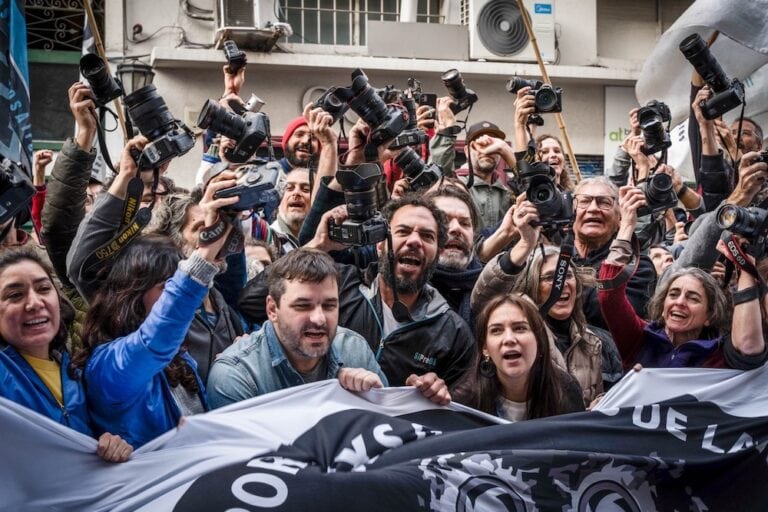(Periodistas/IFEX) – The following is a 7 October 1999 PERIODISTAS press release: **Updates IFEX alerts of 13 September and 7 May 1999 and 9 November 1998** As the result of a hearing held on Friday 1 October before the Inter-American Commission on Human Rights (Comision Interamericana de Derechos Humanos, CIDH), the state of Argentina could […]
(Periodistas/IFEX) – The following is a 7 October 1999 PERIODISTAS press
release:
**Updates IFEX alerts of 13 September and 7 May 1999 and 9 November 1998**
As the result of a hearing held on Friday 1 October before the
Inter-American Commission on Human Rights (Comision Interamericana de
Derechos Humanos, CIDH), the state of Argentina could agree to, together
with the association PERIODISTAS, search for an amicable solution to the
current restrictions to freedom of expression. The solution would require
the government’s commitment to introduce legal reforms that would amplify
the protection of this right.
In January 1999, PERIODISTAS denounced the fact that two articles of the
American Convention on Human Rights had been violated. The accusation
referred to three Argentinian Supreme Court rulings against two journalists
and a television actor (see IFEX alert of 13 September 1999).
As a result, the CIDH summoned the Argentinian government and the
Association PERIODISTAS to a hearing at the Organization of American States
headquarters in Washington. Vice-President Horacio Verbitsky assisted on
behalf of PERIODISTAS, accompanied by Viviana Krsticevic, the director of
the Center for Justice and International Law based in Washington, Joel
Simon, deputy director of the New York-based Committee to Protect
Journalists, Rupa Patel, a member of the International Consortium of
Investigative Journalists, Martín Abregú, the director of the Centre for
Legal and Social Studies (Centro de Estudios Legales y Sociales), and Damián
Loretti, legal advisor to the Argentinian Federation of Press Workers.
During the hearing, Verbitsky proposed that an amicable solution be found
and submitted a document to the Commission, which had been prepared by the
lawyers of the Hernán Gullco Association for Civil Rights, Alejandro Carrio
and Monica Román, outlining the accusation against the government. A number
of opinions of eminent jurists were also provided as voluntary submissions
to the court (amicus curiae).
The Argentinian government was represented by the Ministry of External
Affairs’ legal advisor on human rights, Monica Pinto. In her presentation,
Pinto did not refute Verbitsky’s statement referring to the cases in
question, she agreed to communicate to the government the amicable solution
proposed by PERIODISTAS and expressed her personal opinion in favour of the
proposal. CIDH President Robert Goldman set a timeline of fifteen days to
allow the Argentinian govenrment to respond. If the government agrees to the
proposal, the Commission has established that the Special Rapporteur for
Freedom of Expression, Santiago Canton, will be responsible for assisting
the two parties.
Once summoned to appear at the hearing, the Argentinian state had two
options to choose from: reject the charges it was accused of, or search for
an amicable solution. In the first case, the CIDH would have to analyse the
file and make a recommendation to the Argentinian state. If the
recommendation is not followed, the Inter-American Justice Court would have
to intervene. Nevertheless, the Argentinian government could opt for the
second option, as it did in a similar legal process initiated by Verbitsky
in 1992. That case resulted in a commitment from the state to repeal the
crime of contempt (desacato) from the Argentinian Criminal Code. This change
was approved by unanimous vote of both chambers of Congress in 1994.
The amicable solution currently being proposed by PERIODISTAS outlines the
need for the ratification of a legal reform proposal prepared by the
association that modifies the civil and criminal codes so that they are in
congruence with the principles of the Constitution and international
treaties on Human Rights, as refers to the protection of the right to free
expression. Last month, PERIODISTAS presented the reform proposal to the
presidential candidates of the majority parties, Eduardo Duhalde and
Fernando De la Rúa. Both individuals promised to promote the initiative if
they are elected on 24 October.
Under the proposed legal reform, the Campillay and “real malice” doctrines
would be incorporated into current legislation. The Campillay doctrine
establishes that the act of accurately reproducing information obtained from
an explicitly mentioned source is not punishable. The doctrine of “real
malice” states that freedom of access to information on politicians’ actions
takes precedence over the defence of officials’ honour, because this
information directly impacts on the essence of a republic founded on the
sovereign good. If the officials feel wronged, it is up to them to
demonstrate in a civil, and not criminal, court that the information is
false and that the person who distributed it was aware of this.


